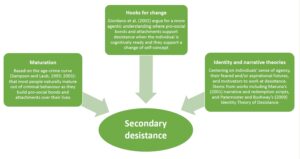Developing the probation evidence base
One of the many downsides to the disastrous re-design of probation known as Transforming Rehabilitation is that almost all academic and research focus has been on the new model and structures. There has been a pause in developing the probation evidence-base and, with it, new evidence-based practice.
Her Majesty’s Inspectorate of Probation is keen to fill at least part of this gap and has decided to use the significant amounts of data it collects in its inspections to develop the probation evidence base.
You can see its mission statement here and its programme of work is reproduced below:
We are undertaking secondary analysis of existing inspection data to develop the evidence-base underpinning our inspection standards, at both the organisational level and individual case level. Key topics are as follows:
- The quality of service user assessment
- The quality of public protection work
- The availability and delivery of interventions
- Enabling staff to deliver a high-quality service
- The voices of young people under supervision
We will compare findings for different sub-groups (e.g. by age, gender, ethnicity) where possible. We are undertaking new primary research in the following areas:
- The quality of delivery by type of Youth Offending Team
- Methods of service user engagement, including the active engagement of service users in designing, developing and improving the quality of services.
- Remote supervision and new technologies, exploring their effectiveness in managing probation service users.
- Community hubs and other multi-agency facilities, exploring the extent to which they can help to engage probation service users and support their desistance.
- Research and evaluation, exploring the extent to which providers are developing and adding to the evidence-base.
Last week, 19 September 2018, it published its first research bulletin: The quality of service user assessment, whose findings I summarise below.
The findings presented in this bulletin are based upon 1,066 case assessments completed between March 2016 and December 2017. In each case, inspectors considered key questions relating to the sufficiency of assessment, recording rationales for their judgements alongside notable instances of good or poor practice. 672 of these assessments were completed by CRC staff and 394 by the NPS.
The inspectorate uses the ASPIRE acronym (see the graphic above) as its basis for “well-informed, analytical and personalised assessments” which are “the starting point for managing service users”.
Key findings
The HMI Probation research team came to four primary conclusions from their analysis of these 1,066 assessments:
- Well-informed, analytical and personalised assessment was more commonly found in cases managed by the National Probation Service (NPS) than Community Rehabilitation Companies (CRCs). The latter need to ensure that there is sufficient focus within assessment across the key areas of engagement, desistance and keeping other people safe.
- There were clear differentiations in the quality of assessment in terms of: (i)engaging service users and close family members; (ii) reviewing previous records(covering past offending, behaviours and supervision) and assessments; and (iii) obtaining the necessary information and input from other agencies. Giving more consistent attention to these areas will help providers to capture the full range of risks, needs, skills and strengths presented by service users.
- Within CRC cases, there was particular scope for improvement with those service users who had a non-low likelihood of reoffending.
- The divergence in the quality of assessment – between cases retained by the NPS and allocated to CRCs – commenced pre-sentence. The NPS needs to ensure that assessment undertaken at court not only supports sentencing and case allocation, but assists CRC and NPS responsible officers in timely and sufficient assessment and sentence planning following allocation.










2 Responses
Their finding 4 is totally contradictory with NPS policy when I was last in a court team and writing reports when the whole push following E3 was to have the minimum assessment possible at Court and the shortest PSR that could squeeze under the rubric of safe sentencing, the view being that all the real assessment should be done at ISP stage.. It was one of the reasons I left the Service because I couldn’t square it with my professional principles and knew that ,given the pressure field colleagues were under, the likelihood of them having the time to do the work properly was vanishingly small. They need to accept that they can have volume and speed or they can have quality – they can’t have both, especially with dwindling resources not only in Probation but also in other agencies on whom we rely for information. And don’t get me started on IT systems…
Thanks for taking the time to comment, Judith. I have to say that I agree that it’s not possible in the present system to have proper assessments and speedy justice. The CSTR pilot shows that our is possible to have both, bit only if you invest resources. In the case of the pilots, this means having psychiatrists on call.
Best wishes
Russell